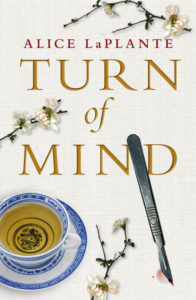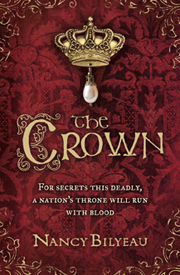 Dr Jennifer White suffers from Alzheimer’s and she is the narrator of this murder mystery (where she is implicated as the murderer). How is this possibly going to work as a narrative? LaPlante cleverly works out a way to give us an intriguing, tense, absorbing novel. Because of her condition, Jennifer is almost always in the present (although she does, at times, fleetingly remember the past) – but her ‘presentness’ is necessarily only contained in brief passages of clarity. Luckily Jennifer is an orthopaedic surgeon, a well-off upper class resident of Chicago so she is erudite and sardonic.
Dr Jennifer White suffers from Alzheimer’s and she is the narrator of this murder mystery (where she is implicated as the murderer). How is this possibly going to work as a narrative? LaPlante cleverly works out a way to give us an intriguing, tense, absorbing novel. Because of her condition, Jennifer is almost always in the present (although she does, at times, fleetingly remember the past) – but her ‘presentness’ is necessarily only contained in brief passages of clarity. Luckily Jennifer is an orthopaedic surgeon, a well-off upper class resident of Chicago so she is erudite and sardonic.
While it is Jennifer who narrates the story, LaPlante uses the device of a journal that is filled in by Jennifer’s carer, Magdalena and her (Jennifer’s) daughter, Fiona, so that Jennifer can read what was said and done the previous day (for example, when she denies something has happened, Magdalena can point to the section of the journal as proof). There are also some letters and photos that have been pasted in that Magdalena or Fiona feel might help Jennifer to remain tethered to her past life.
It’s a bit of a trick, but probably a necessary one, that laPlante includes the dialogue that Jennifer hears but, obviously, doesn’t ‘narrate’ to us as such.
In this way, aspects of the past are slowly pieced together – what Jennifer’s relationship was with her friend Amanda (who has been found murdered with four fingers on her hand amputated), her husband James, and her children Fiona and Mark. A thread of tension runs through when an inquisitive detective takes an ongoing interest in Jennifer.
Running counter to a resolution of the mystery is the deterioration in Jennifer’s condition. Despite her snippiness, the reader can’t help hoping against hope that Jennifer retains her independence, her lucidity. LaPlante beautifully captures the richness of Jennifer’s remembrances and observations, as well as the black humour of the mind getting things askew.
This aspect of the novel is satisfying in itself, even without the murder device. I guess pitching a novel about Alzheimer’s isn’t as attractive as an Alzheimer’s mystery thriller. I felt the final revelation in this strand was weak but this doesn’t detract from the strength of the novel as a whole. There are a lot of these narrow, limited-focus novels on the market lately – S J Watson’s Before I Go to Sleep, Gillian Flynn’s Gone Girl, Paula Hawkins’ The Girl on the Train. They are a one-trick pony but very compelling for all that.


